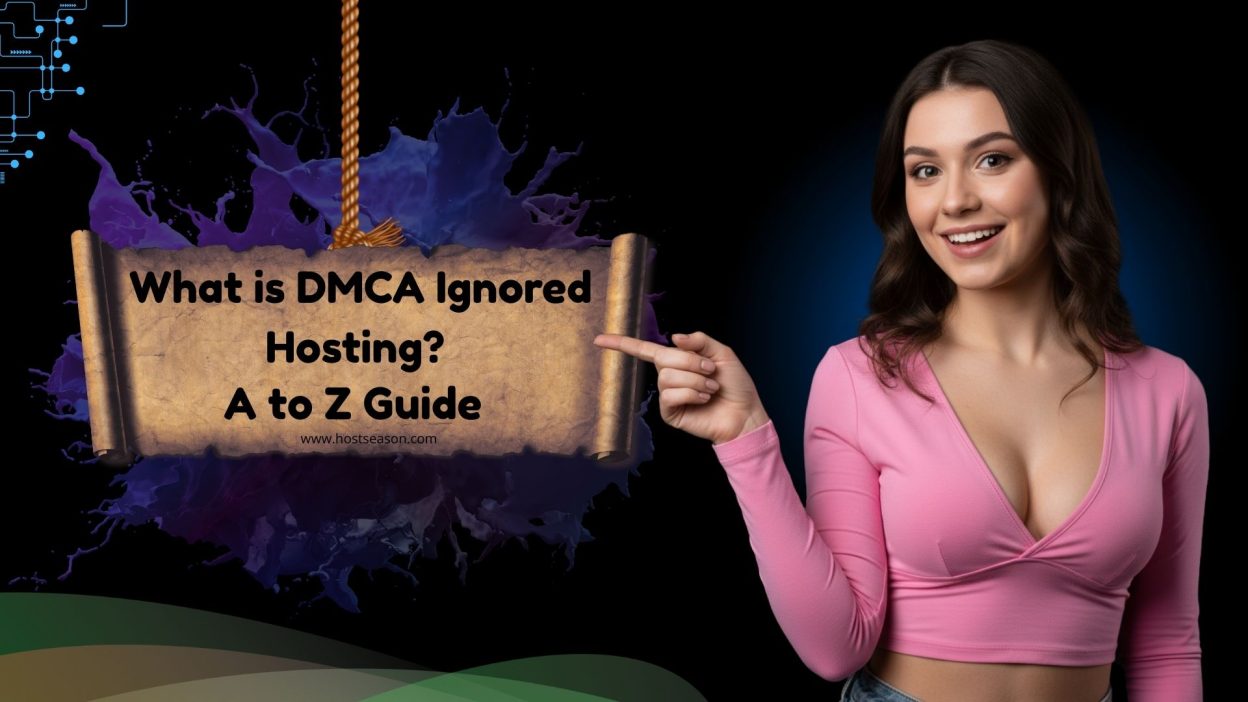Struggling with frequent copyright takedowns on your website? DMCA ignored hosting uses providers outside United State jurisdiction to review complaints under local laws reducing automatic content removals.
hosts removed content within 24 hours of a DMCA notice, often affecting lawful material. This guide covers DMCA basics, hosting types, pros, cons, and provider selection tips.
By the end you’ll have a clear roadmap to decide if DMCA ignored hosting suits your needs ensuring your site stays online with confidence.
Table Of Content
- What is DMCA and How Does It Work?
- What is DMCA Ignored Hosting?
- What are the Types of DMCA Ignored Hosting?
- What are the Pros and Cons of DMCA Ignored Hosting?
- Which Countries Don’t Enforce DMCA Notices?
- Who Should Use DMCA Ignored Hosting?
- FAQs
- Conclusion
What is DMCA and How Does It Work?
The DMCA (Digital Millennium Copyright Act) is a U.S. law allowing copyright owners to request content removal from websites. Hosts comply quickly to maintain “safe harbor” protections.
Passed in 1998, the DMCA lets rightsholders send takedown notices with evidence of infringement, like URLs and sworn statements.
U.S. hosts often remove content within hours to avoid liability.

Site owners can file a counter notice to challenge claims, but “fair use” is a court decided defense, not a host’s decision. Automated systems often lead to over removals, impacting lawful content.
DMCA Process (5 Steps):
- Identify Infringement: Rightsholder collects URLs and evidence.
- Send Notice: They submit a sworn takedown request to the host.
- Remove Content: Host disables access to stay compliant.
- File Counter Notice: Site owner can challenge if content is lawful.
- Resolve Dispute: If no lawsuit follows, content may be restored.
Common Mistake: Assuming hosts verify claims thoroughly they prioritize compliance over accuracy.
Keep detailed records of your content’s legality for counter notices. DMCA ensures quick takedowns but risks removing lawful content due to automation.
What is DMCA Ignored Hosting?
DMCA ignored hosting involves web hosts outside U.S. jurisdiction that evaluate copyright complaints under local laws, not U.S. DMCA rules. “Ignored” means no automatic takedowns, not legal immunity.
These providers, often in countries like the Netherlands or Iceland, follow local regulations. For example a host in Sweden may require a court order before removing content.
However, domain registrars, CDNs, or payment processors may enforce their own rules, so sites aren’t unt Nuevo
System: Untouchable. This hosting model benefits sites facing frequent mistaken takedown notices, such as those hosting lawful but sensitive content.
Example: A blog sharing legal investigative reports could avoid instant removals from automated DMCA flags by using a Dutch provider requiring local legal validation.
Always review the provider’s abuse policy to understand their takedown process. DMCA ignored hosting reduces automatic removals but doesn’t eliminate all risks.
What are the Types of DMCA Ignored Hosting?
DMCA ignored hosting comes in three main types: Shared, VPS, and Dedicated servers. Each offers different levels of control, cost, and performance.
| Type | Cost (USD) | Control | Best For | Downside |
| Shared Hosting | $5-$20/month | Low | Small sites, beginners | Limited resources, IP risks |
| VPS Hosting | $25-$70/month | Medium | Growing sites, UGC platforms | Requires server management |
| Dedicated Hosting | $120+/month | High | High traffic, secure projects | High cost, needs expertise |
- Shared Hosting: Multiple sites share one server. It’s affordable but risks performance if neighbors misuse resources.
- VPS (Virtual Private Server): Offers dedicated resources on a virtual server. Ideal for scaling sites with moderate traffic.
- Dedicated Hosting: A full server for one client. Best for high traffic or sensitive projects.
Essential Add ons:–
- DDoS protection to block cyberattacks.
- Automated backups for data recovery.
- CDN/WAF for speed and security.
Choosing shared hosting for high traffic sites opt for VPS or Dedicated for better performance.
Test backups regularly to ensure data recovery works. VPS is the best balance of cost, control, and scalability for most users.
What are the Pros and Cons of DMCA Ignored Hosting?
DMCA ignored hosting offers unique benefits but comes with risks. Here’s a clear overview.
Pros:
- Fewer Auto Takedowns: Complaints are reviewed under local laws, not U.S DMCA.
- Privacy Options: Some providers support anonymous signups or crypto payments.
- Improved Uptime: Lawful content stays online longer during disputes.
- Custom Security: Tailor server settings to your risk profile.
Cons:
- Legal Risks: Claims can arise based on audience or rightsholder location.
- Provider Variability: Policies, uptime, and support quality differ.
- Upstream Issues: Registrars or CDNs may suspend services independently.
- SEO Challenges: Spammy neighbors can hurt search rankings.
Example: A political advocacy site might stay online during false DMCA claims but could lose its domain if the registrar enforces stricter policies.
Choose providers with transparent abuse policies to minimize surprises. DMCA ignored hosting protects lawful content but requires careful provider vetting.
Which Countries Don’t Enforce DMCA Notices?
The DMCA is a U.S. specific law, so hosts outside the U.S. aren’t bound by it. They follow local copyright laws, which vary by country.
Common regions for DMCA ignored hosting include the Netherlands, Iceland, and Singapore, where local laws often require court orders for takedowns.
However policies differ even within the same country, so verify each provider’s approach.
Provider Vetting Checklist:
- Confirm local legal standards for content removal.
- Review registrar and CDN terms for independent actions.
- Check data retention and privacy policies.
Don’t assume all hosts in a country handle DMCA notices the same way always check specifics. Non U.S hosts follow local laws, but thorough research is critical.
Who Should Use DMCA Ignored Hosting?
DMCA ignored hosting is ideal for lawful projects facing frequent mistaken takedowns, not for mainstream businesses needing broad compliance.
Best For:
- Investigative journalism with documented lawful content.
- User generated content (UGC) platforms hit by false positives.
- Advocacy or political sites facing mass reported complaints.
- Privacy focused teams with strong technical skills.
Not Suitable For:
- Sites relying on ad networks or app stores with strict policies.
- Businesses in regions with aggressive copyright enforcement.
- Teams lacking server management resources.
Example: A whistleblower platform hosting verified leaks benefits from slower takedowns, while an e-commerce site needing ad revenue wouldn’t.
Document your content’s legality to strengthen your defense in disputes. DMCA ignored hosting suits high risk, lawful content, not mainstream projects.
FAQ’s
1. What is DMCA ignored hosting?
Web hosting outside U.S. jurisdiction that reviews copyright complaints under local laws not DMCA.
2. How does DMCA ignored hosting work?
Providers assess takedown requests based on local regulations, avoiding automatic removals.
3. Is DMCA ignored hosting legal?
Yes, if content complies with local laws but legal risks remain in other jurisdictions.
4. What are the risks of DMCA ignored hosting?
Legal exposure inconsistent provider policies, upstream service interruptions and SEO issues.
5. Which countries offer DMCA ignored hosting?
The Netherlands, Iceland, and Singapore are common, but policies vary.
6. Who benefits from DMCA ignored hosting?
Journalists UGC platforms and advocacy sites facing false takedowns.
7. Can I get DMCA ignored hosting for free?
Some providers offer trials, but reliable plans start at $5/month.
8. Does DMCA ignored hosting prevent all takedowns?
No local laws and upstream services (e.g., registrars) can still enforce removals.
Conclusion
MCA ignored hosting is not a magic shield against copyright enforcement, but it provides greater flexibility for site owners who face frequent or mistaken takedowns under U.S. law.
By choosing providers outside U.S. jurisdiction, you can reduce the risk of automated removals and keep lawful yet sensitive content online. However, it’s important to remember that “ignored” does not mean “immune” local laws, registrars, and upstream services can still act against you.
For most projects, especially journalism, advocacy, or user generated platforms, this type of hosting can be a practical safeguard. But it comes with trade offs: higher costs, the need for technical expertise, and varying levels of protection depending on the host and country.
Before making a decision, carefully review a provider’s abuse policy, assess your content’s legality, and align your hosting choice with your long term goals. Done right, DMCA ignored hosting in 2026 can give you more control, resilience, and peace of mind for keeping your website accessible worldwide.



